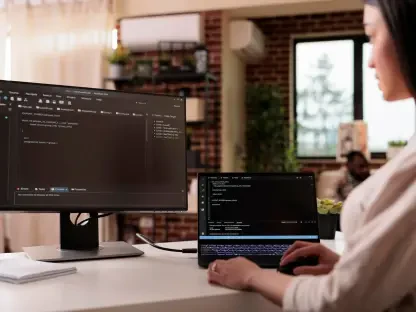The BSV Association has taken a significant step forward in August 2024 by releasing a new Software Development Kit (SDK) designed for the Go programming language. This innovative SDK extends the reach of BSV blockchain to a wider community of developers who prefer Go, complementing the existing libraries for Python and TypeScript. The Go SDK is now available on GitHub, complete with detailed instructions, making it more accessible for developers to tap into the potential of the BSV blockchain. The introduction of this tool as part of the BSV Blockchain Libraries Project aims to simplify the complexities of developing on the BSV blockchain, thereby fostering a more skilled developer pool while adhering to best practices.
Features and Advantages of the Go SDK
The Technical Merits of Go
Go, also referred to as Golang, is a language created by Google in 2009, coincidentally the same year Bitcoin was introduced. Its attributes like simplicity, rapid compiling times, and strong concurrency support have made it a favorite for systems programming, distributed computing, cloud infrastructure, and microservices. One of the remarkable features appreciated by developers is its balanced blend of ease of understanding and low-level efficiency, aligning it with languages such as C or Rust. Given these characteristics, Go becomes particularly apt for developing efficient, containerized backend applications that can scale across distributed systems.
David Case, one of the contributors to the Go SDK, highlighted Go’s performance benefits, pointing out that it is faster than JavaScript or Python and simpler than C++ or Rust. According to Case, the simplicity of Go does not come at the expense of performance, which makes it ideal for blockchain development. Luke Rohenaz, another contributor, emphasized that Go is not only easy to read and understand but also offers robust low-level performance. This combination makes it a fitting choice for a systems library aiming to deliver cross-platform outputs. This new SDK bridges the gap between ease of use and powerful performance, effectively inviting more developers to explore the BSV blockchain.
In-Depth Feature Set
The Go SDK brings a suite of BSV and blockchain-specific tools to the table. These include cryptographic primitives, Script-level constructs, transaction construction and signing, transaction broadcast management, Merkle Proof verification, serializable SPV structures, and secure encryption and signed messages. These features collectively standardize the essential tools required for BSV blockchain development. This standardization greatly reduces the learning curve for developers new to blockchain while incorporating the critical concepts necessary for BSV’s sophisticated data processing and security capabilities.
By offering these standardized tools, the Go SDK aims to lower the barriers to entry for developers of all skill levels, making blockchain development more accessible. This effort aligns with the original Bitcoin protocol rules set by Satoshi Nakamoto, which allows BSV to scale limitlessly and handle various data types, ranging from financial transactions to large-scale enterprise applications. Moreover, the network’s speed and minimal transaction fees pave the way for micro and nano-transactions, potentially giving rise to new economic models and opportunities. The Go SDK is not just a toolkit; it is an enabler of innovation in blockchain applications.
Broader Impact and Future Directions
Facilitating Developer Engagement
The overarching trend emphasized by the BSV Association is its mission to lower technical barriers and make blockchain development more accessible to a diverse group of developers. By rolling out comprehensive and standardized tools, they aim to cultivate a rich pool of talent well-versed in the best practices of blockchain development. This mission is exemplified by the Go SDK, which embodies the balance between high performance and developer-friendly simplicity, making it easier for coders of varying expertise to engage with the BSV blockchain effectively.
One significant advantage is that the Go SDK allows businesses and organizations to build sophisticated applications on BSV’s scalable and fast proof-of-work blockchain. By providing more standardized resources, companies can rely on a consistent and robust development process, potentially shortening development cycles and reducing costs. This also means a lower entry threshold for budding entrepreneurs and smaller firms, broadening the ecosystem and bringing in more innovative applications built on BSV. Such initiatives foster a thriving community and extend the reach and utility of the BSV blockchain, aligning with its goal to become a universally accessible and efficient data ledger.
Aligning with Industry Trends
The BSV Association made a major advancement in August 2024 by launching a new Software Development Kit (SDK) tailored for the Go programming language. This groundbreaking SDK broadens the appeal of the BSV blockchain to developers who prefer Go, complementing the available libraries for Python and TypeScript. The Go SDK can now be found on GitHub, where it includes comprehensive instructions, making it easier for developers to harness the capabilities of the BSV blockchain. This addition to the BSV Blockchain Libraries Project aims to demystify the development process on the BSV blockchain, encouraging a more skilled and knowledgeable developer community. By simplifying the complexities traditionally associated with blockchain development, this initiative is designed to foster adherence to best practices and drive innovation. Through these efforts, the BSV Association seeks to expand its ecosystem, attract more developers, and enhance the overall adoption and utilization of BSV blockchain technology.









